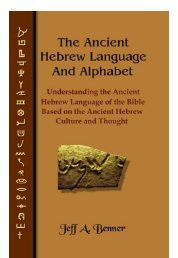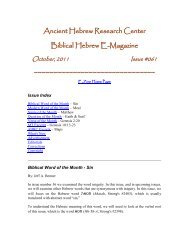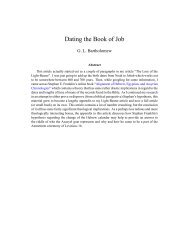My Name Forever - Ancient Hebrew Research Center
My Name Forever - Ancient Hebrew Research Center
My Name Forever - Ancient Hebrew Research Center
Create successful ePaper yourself
Turn your PDF publications into a flip-book with our unique Google optimized e-Paper software.
<strong>My</strong> <strong>Name</strong> <strong>Forever</strong> 6<br />
Nehemiah, that the children of some Jews, who had taken foreigners for wives, could not<br />
speak pure <strong>Hebrew</strong>, if that tongue had ceased to be vernacular among the people in<br />
general a hundred years before that period?...<br />
6thly. It is highly absurd and unreasonable to suppose that the writers of the New<br />
Testament used the term <strong>Hebrew</strong> to signify a different language from that which the<br />
Grecizing Jews denoted by that name; but the language which those Jews called <strong>Hebrew</strong><br />
after the Babylonish captivity, was not Syriac, or Chaldee, but the same in which the law<br />
and the prophets were written...<br />
Lastly. It may be worth adding, that Josephus, who frequently uses the expressions thn<br />
‘EBRAIWN dialekton [the <strong>Hebrew</strong> dialect], glwttan thn ‘EBRAIWN [the <strong>Hebrew</strong> tongue],<br />
‘EBRAISTI [in <strong>Hebrew</strong>] 18 , for the language in which Moses wrote... tells us... that towards<br />
the conclusion of the siege of Jerusalem he addressed not only John, the commander of<br />
the Zealots, but toij polloij the (Jewish) multitude who were with him, ‘¸EBRAIZWN in<br />
the <strong>Hebrew</strong> tongue, which was therefore the common language of the Jews at that time,<br />
i.e. about forty years after our Savior’s death.<br />
On the whole, I conclude that the Jews did not exchange the <strong>Hebrew</strong> for the Chaldee<br />
language at the captivity... 19<br />
17. The text of the Mishnah, 20 compiled at the beginning of the third century C.E. by Judah the<br />
Prince, corroborates this point of view. Written almost entirely in <strong>Hebrew</strong>, 21 it reflects not only the “Oral<br />
Tradition” of second temple times, but the language in which that tradition was communicated. In the<br />
words of the Mishnah, “A man is obligated to speak in his Rabbi’s tongue” (Eduyot 1:3). M. H. Segal, in<br />
discussing the <strong>Hebrew</strong> of the Mishnah, has this to say on the subject:<br />
In conclusion, we must refer briefly to the linguistic trustworthiness of the Mishnaic<br />
tradition... Its trustworthiness is established by the old rule, older than the age of Hillel,<br />
that a tradition - which of course, was handed down by word of mouth - must be<br />
repeated in the exact words of the master from whom it had been learnt: r nIk o st cH j<br />
ICr iIJk C [A man is obligated to speak in his Rabbi’s tongue] 22 . This rule was strictly<br />
observed throughout the Mishnaic and Talmudic periods (cf. ‘Ed. i.3, with the<br />
commentaries; Ber. 47a; Bek. 5a), and was in fact, the basis of the authority of the Oral<br />
Law. So careful were the Rabbis in the observance of this rule that they often reproduced<br />
even the mannerisms and the personal peculiarities of the Masters from whom they had<br />
received a particular tradition, or halaka. This rule makes it certain that, at least in most<br />
cases, the sayings of the Rabbis have been handed down in the language in which they<br />
had originally been expressed. 23<br />
18 Translations in brackets [ ] added for clarity.<br />
19 John Parkhurst: A Greek And English Lexicon To The New Testament (London,1809), pp. 181-182.<br />
20 The Mishnah is a compilation of what had been, until then, the “Oral Law” of Judaism.<br />
21 The <strong>Hebrew</strong> of the Mishnah is appropriately known as “Mishnaic” <strong>Hebrew</strong> or “MH.”<br />
22 Translation in brackets [ ] added for clarity.<br />
23 M. H. Segal: A Grammar of Mishnaic <strong>Hebrew</strong> (Oxford, 1983), p. 19.






